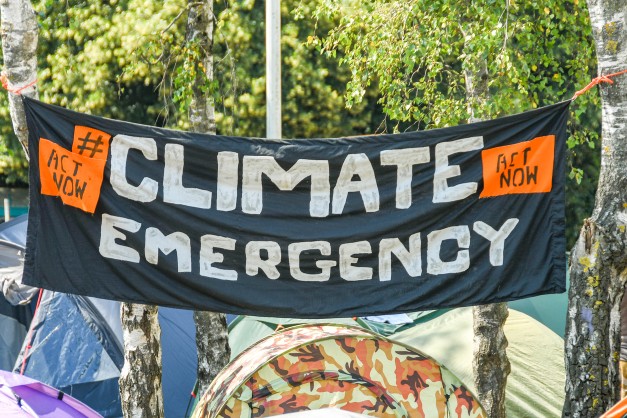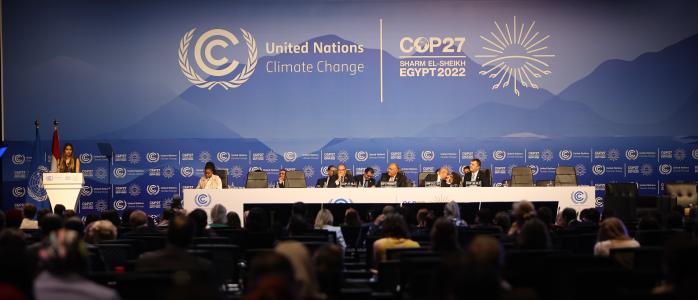



The Sixth Assessment Report of the Intergovernmental Panel on Climate Change (IPCC) reads like a disaster novel. A summer filled with extreme climate events, July’s all-time record temperatures, and the recent unprecedented rainfall in Greenland underscore its dire, aptly timed warning of escalating climate change. The report indicates that the world needs significantly enhanced climate action to limit global warming to 1.5°C above pre-industrial levels, a threshold that is now locked in. India’s environment minister, Bhupendra Yadav, accurately called the publication “the last signal” for decisive action. Yet the IPCC’s forecasts, though disconcerting, should surprise no one. They are a direct result of the inadequate global political support and action that has so far characterised the international climate regime.
Pre-2020 climate agreements put the onus on developed nations to reduce greenhouse gas (GHG) emissions based on the principle of “common but differentiated responsibilities”. But a lack of serious action during this period has led to protracted spells of abnormally high temperatures and extreme climate events today. Their poor performance is a result of climate skepticism, weak targets, the non-participation of economies in pre-2020 accords, and the agreements’ lack of environmental integrity. Each of these factors merits closer examination.
Climate skepticism: Skepticism of the scientific truth of human-induced climate change has a long history. Oil and coal-based industries, tobacco companies, and conservative think tanks with political and ideological interests have all lobbied heavily against climate action. They have even funded climate deniers to propagate the falsehood that climate models are unreliable, with too much “scientific uncertainty”. Their efforts to sway public opinion have been instrumental in limiting political initiative to combat the climate crisis.
Weak pre-2020 targets, and weaker implementation: Emissions reduction requirements for countries taking part in the Kyoto Protocol (2008-12) and the Doha Amendment to the Kyoto Protocol (2013-20) sparked concerns that these targets were neither ambitious nor urgent enough. Still, there were no consequential efforts to enhance them. What about actual mitigation performance? A recent study by the Council on Energy, Environment and Water (CEEW) highlights that emissions for both industrialised economies and economies-in-transition (EITs) declined by only 14.8 per cent in 2019 compared to base year levels, compared with an already weak target of 18 per cent by 2020. Further, the countries collectively emitted a staggering 25.1 GtCO2eq more than their estimated emission allowances in the 2008–2020 period.
Non-participation of developed nations: Many major economies did not participate in pre-2020 climate agreements. The U.S., the world’s second-largest emitter, decided not to ratify the Kyoto Protocol. Canada withdrew from the agreement to avoid billions of dollars in non-compliance penalties. Japan, Russia, and New Zealand did not accept new targets in the Doha Amendment. The result: GHG emissions are still rising, and countries are not addressing them quickly enough.
Lack of environmental integrity: The pre-2020 climate agreements’ accounting provisions helped some developed countries achieve their targets without significant mitigation efforts. For instance, choosing the late 1980s or 1990s as base years for EITs led to inflated base year emissions. Another example is Australia, which benefited significantly by adding deforestation emissions to its base year emissions.
A game plan for smarter climate action
The IPCC says it is “unequivocal” that human influence has warmed the planet. With less than two months to go for COP26, it is time for countries to stop hiding behind climate skepticism and accounting provisions and confront the truth: this is the last roll of the dice. Here are three ways in which countries can avoid repeating the failures of the pre-2020 era and ensure that the billions of dollars spent on climate research and action yield results.

First, divide the carbon budget equitably. The IPCC report shows that the world can emit only about 500 GtCO2 starting in January 2020 for a 50 per cent probability of limiting global warming to 1.5°C. Given this limited available carbon space, the global carbon budget’s distribution should compensate for pre-2020 imbalances. Developed nations should mainly shoulder the burden of decarbonisation; they must directly deduct the additional carbon space they consumed in the pre-2020 era from their post-2020 budgets. Also, all countries, especially developed nations, should consider enhancing their climate targets and aligning them with the 1.5°C scenario.
Second, make post-2020 commitments more inclusive. Future climate agreements should address a broader range of issues, including loss and damage, adaptation actions, climate finance, and transparency. These issues are contentious, which makes it imperative to address them. So when the world leaders sit down again in the upcoming deliberations at Glasgow this November, we hope that the negotiations will incorporate these neglected issues and showcase commitments that are not only bold but also comprehensive and transformative.
Third, strengthen accountability. The success of post-2020 climate agreements depends on active, sincere, and enthusiastic participation by all countries. To build their trust, we need mechanisms for dealing with non-participation, low ambition, inadequate reporting, accounting loopholes, and easy exits from accord. This means that it is essential to eliminate the existing shortcomings and ambiguity and ensure that accounting provisions are not taken advantage of to proclaim higher compliance by countries.
The pre-2020 outcomes clearly highlight the need for collective action, rebuilding trust, and most importantly, strong leadership. With COP26 due in November, we must draw lessons from our past experiences and apply them diligently to future climate action. We must do more and we must do it quicker.
Jhalak Aggarwal is a Research Analyst, Sumit Prasad is a Programme Associate, and Shikha Bhasin is Senior Programme Lead at the Council on Energy, Environment and Water; Send your comments to [email protected] and [email protected]






Add new comment